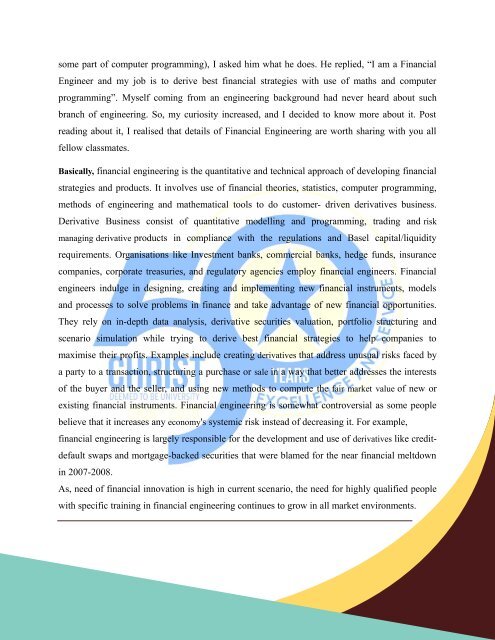Finometric July 2018 (1)
You also want an ePaper? Increase the reach of your titles
YUMPU automatically turns print PDFs into web optimized ePapers that Google loves.
some part of computer programming), I asked him what he does. He replied, “I am a Financial<br />
Engineer and my job is to derive best financial strategies with use of maths and computer<br />
programming”. Myself coming from an engineering background had never heard about such<br />
branch of engineering. So, my curiosity increased, and I decided to know more about it. Post<br />
reading about it, I realised that details of Financial Engineering are worth sharing with you all<br />
fellow classmates.<br />
Basically, financial engineering is the quantitative and technical approach of developing financial<br />
strategies and products. It involves use of financial theories, statistics, computer programming,<br />
methods of engineering and mathematical tools to do customer- driven derivatives business.<br />
Derivative Business consist of quantitative modelling and programming, trading and risk<br />
managing derivative products in compliance with the regulations and Basel capital/liquidity<br />
requirements. Organisations like Investment banks, commercial banks, hedge funds, insurance<br />
companies, corporate treasuries, and regulatory agencies employ financial engineers. Financial<br />
engineers indulge in designing, creating and implementing new financial instruments, models<br />
and processes to solve problems in finance and take advantage of new financial opportunities.<br />
They rely on in-depth data analysis, derivative securities valuation, portfolio structuring and<br />
scenario simulation while trying to derive best financial strategies to help companies to<br />
maximise their profits. Examples include creating derivatives that address unusual risks faced by<br />
a party to a transaction, structuring a purchase or sale in a way that better addresses the interests<br />
of the buyer and the seller, and using new methods to compute the fair market value of new or<br />
existing financial instruments. Financial engineering is somewhat controversial as some people<br />
believe that it increases any economy's systemic risk instead of decreasing it. For example,<br />
financial engineering is largely responsible for the development and use of derivatives like creditdefault<br />
swaps and mortgage-backed securities that were blamed for the near financial meltdown<br />
in 2007-2008.<br />
As, need of financial innovation is high in current scenario, the need for highly qualified people<br />
with specific training in financial engineering continues to grow in all market environments.



